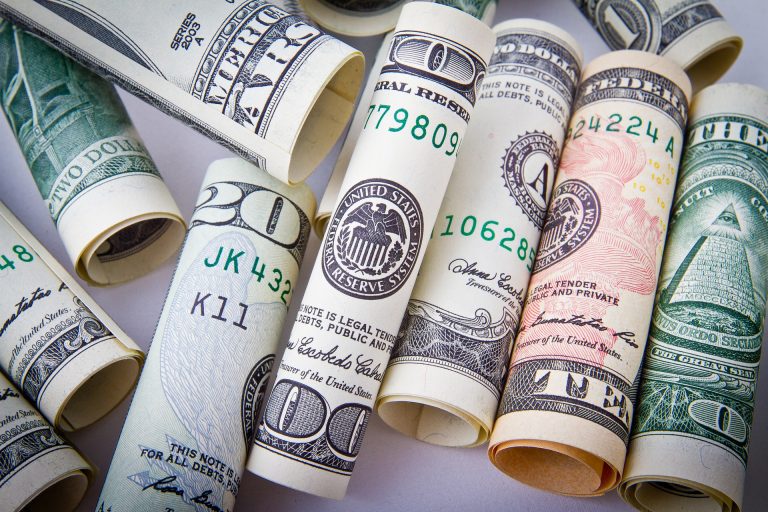For many years our household could not cover an unexpected bill in cash. We simply did not have a plan for our money even though we had a large income. We were living paycheck to paycheck. This meant no cash savings. When an unexpected bill popped up we relied on credit cards to bail us out. For years this strategy seems to work, as the added debt only increase our minimum payments slightly, not causing us too much pain.
This cycle went on for ten plus years before our creditors called our bluff. We had maxed out five different credit cards to the tune of $109,000 worth of consumer debt. With no more credit available and no cash on hand, we finally realized that our strategy had to change. There was no magic cash app to help mysteriously inflate our saving account. It would take hard work, budgeting and changing our money habits to finally build a cash reserve. So when I read a recent report by the Associated Press that stated Two-thirds of Americans would have difficulty coming up with the money to cover a $1,000 emergency, I can relate.
Reports Key Findings
The Associated Press-NORC Center for Public Affairs Research performed a nationwide poll of adults. Interviews were conducted during April 2016, online, and using landlines and cellphones. Here are some of the polls’ key findings:
- Most Americans, 57 percent, describe the national economy as poor and only 23 percent think it will improve over the next year.
- The public does not believe the economy has been restored since the financial crisis of 2008. Only 22 percent of people say the economy has mostly or completely recovered from the recession.
- More affluent Americans are inclined to have a rosier view of the economy, while those with lower incomes tend to be more doubtful. Two-thirds of people with annual household incomes over $100,000 say the economy is at least halfway back from the recession, while half of those with incomes under $30,000 say there has been little or no recovery.
- In general, Americans are more positive about their own finances with 66 percent describing them as good.
- However, most employed Americans have not seen a salary increase in recent years. Forty-six percent say their pay has stayed the same and 16 percent have experienced pay cuts.
- Only 28 percent of adults have confidence they would be able to find equal or better employment if they left their current position.
- Few workers expect to have enough savings to retire on their own timetable. About half, 54 percent, have little or no confidence that investments will enable them to retire when they want to leave the workplace.
- Two-thirds of Americans would have trouble immediately paying an unanticipated bill of $1,000. Eleven percent say they would not be able to pay an unexpected bill of $1,000 at all and another 45 percent report they would need to borrow money.
The result that stands out to me is the salary increase findings. In the profession, I work in and companies and vendors I work with this has not been the case. Even with family and friends, I can only recall one friend who took a pay cut to keep jobs at a company he works for. Also, polls conducted by CBS News and The New York Time in 1995, 2006, and 2007 reported similar overall finding that Two-thirds of Americans would have trouble immediately paying an unanticipated bill of $1,000. So over the last twenty years, the problem has not gotten better.
Is Education Is the Key
I can only think more education is the key. How many of us were taught financial literacy in high school or college? Has your company ever offered a financial education workshop? I realize for some being educated on financial topics will not change their bad behaviors with money, but for some, it will.
The personal finance community is a great community full of smart people who have many interesting and different stories of how they have dealt with money, debt, student loans etc. I’m just not sure blogging and podcasting will change the world. That’s why I got involved with my local school district and began championing financial literacy. We need to do more as individuals and as a community to get in front of real people and help them. If we don’t, another twenty years will go by and the finding will be the same or even worse.
So please tweet #Financialliteracy and tell me how you are going to get involved and change the course of personal finance for everyone.
[bctt tweet=”I’m helping others by… #Financialliteracy” username=”debtdiscipline”]
Could you cover an unexpected bill of a $1000 in cash? What approach would you take to try to improve your cash saving?

Brian is a Dad, husband, and an IT professional by trade. A Personal Finance Blogger since 2013. Who, with his family, has successfully paid off over $100K worth of consumer debt. Now that Brian is debt-free, his mission is to help his three children prepare for their financial lives and educate others to achieved financial success. Brian is involved in his local community. As a Financial Committee Chair with the Board of Education of his local school district, he has helped successfully launch a K-12 financial literacy program in a six thousand student district.

